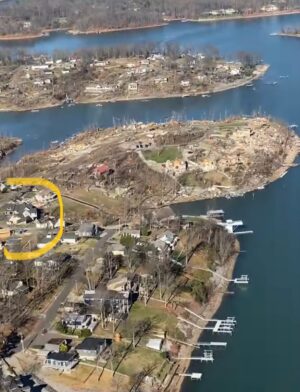Marshall County woman lives with survivor’s guilt

A multitude of responses happen during tragedies. The tragedy itself is damaging, and so are the physical, emotional and mental effects.
One of these effects is survivor’s guilt, or when people feel guilty because they survived a life-threatening event that others did not.
Angie Fristoe now lives with survivor’s guilt. Fristoe lives in Sherwood Shores in Gilbertsville, Kentucky. Not only does she live in the community adjacent to Cambridge Shores, a neighborhood that the Dec. 10 tornado devastated, her house was one of two in her neighborhood that remained standing.
https://goo.gl/maps/17m8LtYG9tvGQRda9
The tornado destroyed the houses directly to the left and right of Fristoe’s home.


Photos courtesy of Angie Fristoe
“I felt guilty because my home was still here and everybody had just lost everything,” Fristoe said. “Why was I spared and so many of my friends weren’t? That’s why I volunteered for two solid weeks – every day as much as I could. I needed to fill that guilt. I wanted to do all that I could for others.”
During the tornado, Fristoe and her family took shelter in their basement. They went outside to inspect the damage after the tornado passed. Since their home was okay, they anticipated that others’ homes would be, too. They learned quickly that was not the case.

“It was unrecognizable,” Fristoe said. “You didn’t know what road you were on – what road you were walking to.”
Although they had minimal damage to their home, the Fristoes experienced mental and emotional distress.
“Just seeing our friends in our community have to go through what they went through was hard,” Fristoe said.
Fristoe welcomed survivors into her home. At one point, she had 20-25 people in her house.
“We just did what we thought we were supposed to do — get everyone to a safe and dry place,” Fristoe said. “I don’t want any credit for that whatsoever. I was doing what I thought I was called to do.”
Fristoe described her experience with this tragedy in one word: perspective.
“It definitely broadened my perspective,” Fristoe said. “What I’m here for and why we’re all here. It’s not material things, it’s relationships.”
‘Empathy never begins with the words ‘at least’’
Mallory Hlava
Kayla Powell lives in Benton, Kentucky, and works as a children’s therapist in Paducah, Kentucky. She has never been fearful of storms. When she heard about the incoming severe weather on Dec. 10, she only expected to have a power outage.
“Should we leave?” Powell asked her husband after stepping outside of her home and immediately feeling an eeriness in the air.
Powell, her husband, their three children and their pets traveled a short distance to her mother-in-law’s house, which has a basement.
“I will always remember the sounds of what was happening outside,” Powell said.
The calm after the storm prompted Powell and her family to return home. They were met with trees and power lines blocking their path, so they returned to her mother-in-law’s.
Powell and her family remained oblivious to the condition of their home. Neighbors worriedly called her because the house was almost completely destroyed, but the family was nowhere in sight.
The tornado struck Powell’s home, leaving behind her and her husband’s room and her son’s room.
Photo: The damage to Powell’s Kitchen. The day after the tornado and April 2022.

The Powells decided not to rebuild and have since moved into a new home. They received assistance from the American Red Cross, the Marshall County tornado relief fund, Elks Disaster Relief Program and Marshall County Schools.
“I don’t even know how to say thank you to everybody,” Powell said. “It is overwhelming, and we are so blessed.”
“Empathy is seeing with the eyes of another, listening with the ears of another and feeling with the heart of another,” Alfred Adler once said.
Although the Powells seem lucky because they were not in their home during the tornado, that does not mean they aren’t as traumatized.
Powell said she struggles with long-term effects, such as getting triggered if the wind blows a certain way.
“So many people have said ‘at least this, or at least that, at least this didn’t happen, at least you weren’t inside,’” Powell said. “Empathy never begins with the words ‘at least.’ Using the word ‘at least’ minimizes the things that have taken place.”




